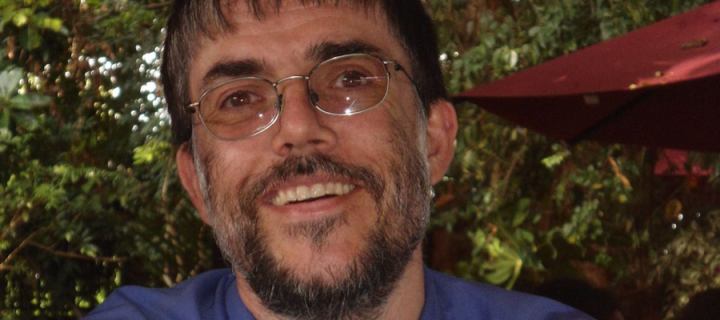Oliver Stegen
Oliver Stegen ended up in Edinburgh by chance and used his Linguistics degree while living and working among the Rangi in Tanzania, learning their language and helping local teachers to devise a writing system.
| Name | Oliver Stegen |
| Degree Course | MA (Hon) Linguistics & PhD Linguistics |
| Year of Graduation | 1993 & 2011 |

Your time at the University
When I first arrived in Edinburgh in 1991, it was less me having chosen Edinburgh as rather Edinburgh having been chosen for me: my fiancée had just moved to Britain, and my phonetics professor at the German university I was studying at then had offered to send me to Edinburgh on an Erasmus programme with a full stipend – so it was really a no-brainer for me to seize that opportunity. It turned out to be love at first sight: Edinburgh, the Athens of the North, with its vibrant culture and history, the university’s academic vigour as well as the dynamic life of student societies (something which I didn’t know to that extent in my native Germany) – I sang tenor in the Chamber Choir and became involved in the Christian Union.
Professionally, my linguistic skills were honed both in class and in special events like the Linguistic Circle talks where I could learn from internationally renowned linguists’ first-hand. So it is no wonder that the originally planned one-year stay turned into four years, and we stayed on beyond our wedding and my first graduation. Quite a formative phase of my life!
It turned out to be love at first sight: Edinburgh, the Athens of the North, with its vibrant culture and history, the university’s academic vigour as well as the dynamic life of student societies.
Tell us about your experiences since leaving the University
When coming to Edinburgh in 1991, I was already a member-in-training with SIL, a faith-based non-profit organisation which serves language communities worldwide in an endeavour to preserve and revitalise their languages, and was expected to become one of their linguistic advisors. Despite an offer to continue towards a PhD at Edinburgh, I regarded it as more important to first embark on actual language work. In 1996, we moved to Tanzania to live and work among the Rangi. Learning their language, helping local teachers to devise a writing system, analysing the Rangi grammar, facilitating the set-up of literacy classes and increasingly advising other language projects on linguistic issues – those were my tasks over the next years. Literacy materials were printed and distributed, among them a primer, a story booklet and a collection of Rangi proverbs, and in an affiliated Bible translation project, the book of Jonah was translated and published.
By 2003, I had more than enough Rangi language data to embark on doctoral studies, so I re-enrolled at Edinburgh part-time. Commuting between East Africa and Scotland, between village life and the City, became the foundation for systematizing, analysing and writing up my research, not least due to excellent supervisors and a supportive research student group. My academic publications during those years ranged from morphology (study of the form of words) to sociolinguistics (study of language and society) and from historical linguistics to discourse analysis. A broadening of my horizon which neither location by itself could have achieved! Since then, I have emulated my supervisors’ example and mentored younger colleagues in their development as linguists and academic writers, while continuing as linguistic advisor to various East African language projects.
Alumni wisdom
Invest into relationships! Any knowledge and skills you may acquire are not even worth half without being connected to people. I have certainly benefitted from friendships and acquaintances that I have formed both inside and outside the university. Whenever I come to Edinburgh now, I can count on a number of friends, be it for mutual support and advice or simply to meet and enjoy each other’s company. These relationships have contributed to who I am today, intellectually, spiritually and socially.

